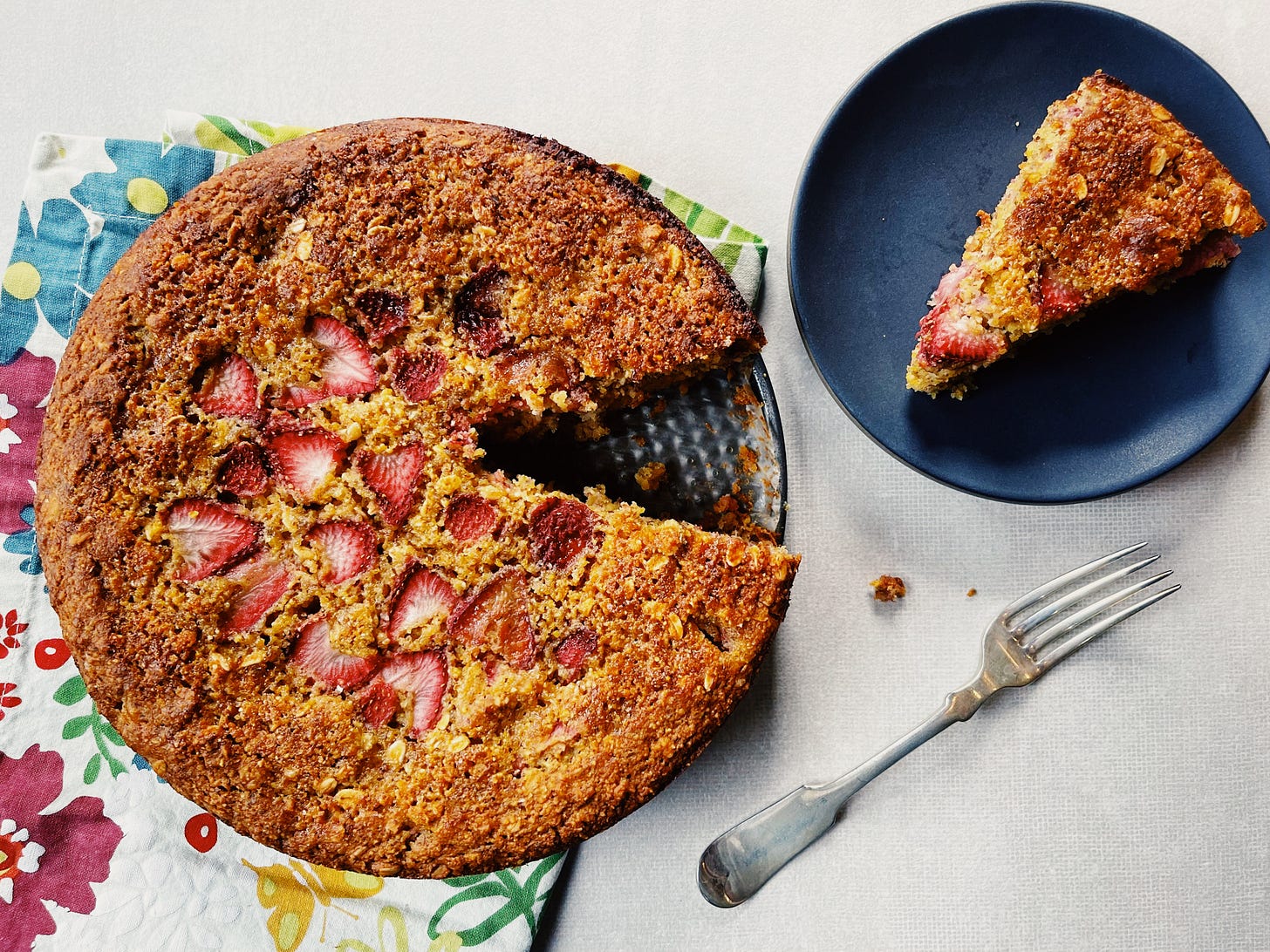Hello, Brain Health Ambassadors. I write to you fresh from the first camping trip of the summer. After three days of trading screen time for sunshine, my brain already feels lighter. My husband and I feasted on camping-friendly brain-healthy food like Matcha Granola (from my book) with yogurt and berries, Portobello Burgers, and my favorite brownies. Getting eight solid hours of sleep plus exercise, fresh air, and good food was like a mini-vacation for my brain.



Just before I left, I gave a talk for Wellness Wednesdays about Brain Healthy Eating: Food vs. Supplements. Today, I am sharing a recap of the talk along with some additional information we didn’t have time for. If you want to watch the Wellness Wednesdays recording, my host Sally Duplantier has graciously agreed to share it with you all.
Clearing up the Confusion about Brain Health Supplements
Brain health supplements can be confusing even for the most educated consumer. While certain supplements are worth your consideration, the field is crowded with products making unsubstantiated claims. It’s important to remember that dietary supplements aren’t evaluated by the Food and Drug Administration, so supplement companies can make claims without having to back them up with science.
The emerging science of brain health supplements
You may be wondering if you need to take a supplement to support your brain health. If you asked me 10 years ago, I would not have been very enthusiastic about taking them. That’s because most studies were plagued by insufficient numbers, suboptimal doses, and not enough years of follow-up.
Now, we have more information to guide us. For example, the science of how omega-3 fatty acids protect the brain from aging keeps getting stronger. We now know that DHA and EPA, the omega-3’s you get from fish, are crucial for maintaining brain cell function and repair with age. And, we know from the research on flavonoid-rich foods that this class of bioactive substances is key for preventing Alzheimer’s. A supplemental form of flavonoid (flavonol) was studied in the COMSOS_MIND study (which I went into here) to determine if it had an impact on cognition.
Taking a multivitamin may improve memory, a new study shows
A new study published last week looked at how taking a daily multivitamin impacted cognition in more than 2,200 older adults. While this study wasn’t long enough to evaluate Alzheimer’s risk reduction, it’s encouraging to see significant improvement in overall cognition, memory, and executive function. Clinical intervention studies using supplements are rare.
Before deciding if a brain health supplement is right for you, ask yourself these questions:
Is your dietary pattern providing all the nutrients your brain needs?
A brain-healthy diet should provide all the nutrients, vitamins, and bioactive substances an aging brain needs to thrive. But does it? Before popping a pill, take a close look at your dietary pattern and consider these factors:
Do you follow a Mediterranean-style diet? If so, what’s your Medi Diet score?
Do you have access to a large variety of whole foods?
How much ultra-processed food do you consume?
Do you skip meals? Or, are you a light eater who may not be consuming enough food to cover the recommended brain healthy food groups?
Are there any foods you avoid or eliminate that could set you up for a deficiency?
It’s estimated that about two-thirds of people in the U.S. aren’t getting enough brain health nutrients from key food groups, especially berries, leafy greens, fish and seafood, and nuts and seeds. Omnivores may be deficient in folate. Those following vegetarian or vegan diets may be deficient in DHA and EPA, choline, and lutein. Vitamin B12 and D deficiencies are common in plant- and meat-eaters alike. Diets that favor eliminating entire food groups (such as the grain-free Paleolithic diet or the low-carbohydrates ketogenic one) can be a source of deficiencies.
Do you have risk factors for heart disease or dementia?
Having heart disease is an important risk factor for Alzheimer’s and other dementias, so it’s important to identify and take action if you are at risk. (I recently wrote about the Simple 7 score here.)
Do you have a family member with Alzheimer’s or another type of dementia? If so, you could be at increased risk, too.
Another common risk factor: carrying one or two copies of the ApoE4 risk gene. Twenty-five percent of all Americans are carriers, and this can greatly increase the risk of getting Alzheimer’s later in life. If so, Alzheimer’s prevention doctors may recommend a personalized nutrition plan that includes supplementation, as proposed in this 2021 paper by Dr. Richard Isaacson and his colleagues.
Would you be committed to taking a brain health supplement every day?
If you choose to take a brain health supplement, consistent use is best. The studies that support taking the supplements on my “Excellent Data” list (see below) are based on daily, not sporadic, use. Getting an adequate dosage is key for brain health nutrients, so consider if you are able to commit to taking a pill (or a few pills) every day.
A brain-healthy diet and lifestyle should be your primary strategy for fending off age-related cognitive decline. No pill will ever replace the neuroprotection of actual whole foods. In the end, it’s up to you (in collaboration with your health care team) to determine what’s best for your individual brain health strategy. To cut through the confusion, I’m creating a handy list you can download and print: The BHK Guide to Brain Health Supplements. Based on the current scientific data, I put these products into three categories:
Brain Health Supplements Backed by Excellent Data
Brain Health Supplements with Promising Data
Brain Health Supplements with Disappointing Data
Paying subscribers: look for the Guide in the next newsletter.
Brain Health Retreats Update
I am excited to see so many BHK newsletter subscribers joining me on Brain Health Retreats. Not only do we spend an entire week deep diving into how to cultivate a brain-healthy life, we have a lot of fun traveling to amazing places and eating incredible food. Here’s where I’ll be retreating with brain health enthusiasts in the next year:
The September 2023 Brain Health Retreat in Sicily is sold out. Stay tuned for an announcement about Sicily 2024.
Rancho La Puerta: I’ll be the visiting chef at this destination wellness resort in Tecate, Mexico (not far from San Diego, CA) on these dates. Inquire directly here.
October 28 to November 4, 2023
March 2 to 9, 2024
November 2 to 9, 2024
November 9 to 16, 2024
The April 2024 Brain Health Retreat in Puglia is sold out. This one filled up quickly! I love the enthusiasm for going to this little-traveled region that spans the heel of Italy’s boot. Join the waitlist here.
New Retreats:
Tuscany, Italy, September 6 to 10, 2023. Details coming soon.
Cabo San Lucas, Mexico, November 9 to 12, 2023. Details coming soon.
One of the perks of being a paying subscriber to this newsletter is you get to hear about retreats as soon as they are announced. Your subscription also gives you access to all my recipes, articles, quizzes, and guides. Here are the most viewed and shared posts from last month:
The Most Popular Articles and Recipes from Last Month
I’ve taken away the paywall on these articles so that everyone has full access. Read, share, and please enjoy my new olive oil cake while strawberries are still in season.
Why you should toss out the junk food
Meet the Editor Behind the Newsletter
Did you know that behind every good writer is a great editor? I am so lucky to be working with the very best: Lindsay Maitland Hunt, and she is now taking on new clients.
Lindsay has been integral behind the scenes at Brain Health Kitchen since 2019. She helped me craft a book proposal, which turned into a book deal (!!!), and ultimately the Brain Health Kitchen book. I tapped into Lindsay’s 14-years of expertise as a writer, editor, and former recipe developer on the text and recipes in the book and now, this newsletter. I am excited to share that Lindsay is taking on new editorial clients for everything from big picture coaching to nitty gritty editing on a single essay to memoir development. Who knows? Maybe one of you has a book in you, too. If you think she might be a good fit for a project you’re working on, book a free 30-minute consultation with her here. I can’t recommend working with her enough!
June is Alzheimer’s Awareness Month
While every month is devoted to Alzheimer’s awareness here, I love how people everywhere rally around brain health in June. When I first started speaking in public about Alzheimer’s prevention, back in 2015, there were a lot of blank stares. The words “Alzheimer’s” and “prevention” were hardly ever used in the same sentence. Now, when I give talks, there is plenty of nodding and engagement. The message is getting out! A brain-healthy lifestyle can fend off neurodegenerative diseases: Alzheimer’s, vascular dementia, and even Parkinson’s. We all deserve to age with healthy, thriving brains.
Before I go, I’d like to thank you for reading, sharing, and taking the best care of your brain. Whether you’ve just subscribed to the newsletter or have been following along since 2017, I applaud your proactive approach to healthy aging. Thank you for being part of the solution to end Alzheimer’s.
June is a busy month! I’ll be out there spreading the word. Founding Members: our quarterly Kitchen Chat and Cooking Class happens this month. More on that soon!
Love,
Annie







Hi, I couldnt download the list of supplements from your newsletter.. Can you send me new link.. thank you!! Laurie
I'm always so happy to receive your newsletter Annie! You dive into and share the most up to date and interesting info to help us live our best lives. Thank you for that!! I love to camp; can you please share the brand of roof top tent you use?
Laurie Lasala-Tuttle 😘